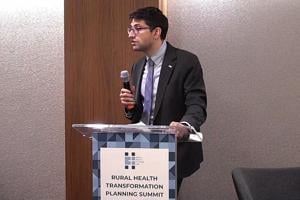Health
States Compete for $50 Billion Rural Health Fund Amid Medicaid Cuts

States across the United States are vying for a share of a new $50 billion rural health fund aimed at addressing critical healthcare challenges in underserved areas. This initiative comes as significant cuts to Medicaid are prompting a re-evaluation of healthcare delivery mechanisms in rural communities. During a recent meeting held at the Watergate Hotel in Washington, D.C., Centers for Medicare & Medicaid Services (CMS) official Abe Sutton emphasized the need for states to rethink their approaches to healthcare rather than merely adjusting payment structures for hospitals.
The urgency of this issue has brought together representatives from more than 40 governors’ offices and state health agencies, including participants from as far away as Hawaii. Sutton outlined that the original vision of simply bolstering rural hospitals is no longer sufficient. Instead, states must submit applications that propose innovative ways to “rebuild and reshape” healthcare delivery in their regions.
This shift in focus reflects a broader recognition that past efforts to change hospital payment models have not yielded the desired outcomes. Sutton pointed out that merely altering payment structures has proven ineffective in enhancing care quality or accessibility in rural settings.
As states prepare their applications for this substantial funding, the competition is becoming intense. Each state is tasked with devising strategies that prioritize sustainable healthcare solutions tailored to their unique demographics and needs. The funding is intended to not only support existing healthcare facilities but also to encourage the development of new models that can better serve rural populations.
The CMS has made it clear that successful proposals will not only require innovative thinking but also a commitment to long-term transformation in healthcare delivery. This marks a significant departure from traditional funding approaches that may have focused primarily on immediate financial relief for hospitals. Instead, the emphasis is now on comprehensive strategies that can lead to enduring improvements in community health outcomes.
As the application deadline approaches, states are mobilizing resources to craft compelling proposals that demonstrate a clear understanding of their local healthcare challenges. The stakes are high, as the outcome of this funding initiative could have lasting implications for the future of healthcare in rural America.
The CMS’s initiative comes at a critical time, as rural healthcare systems face mounting pressures from rising operational costs and decreasing patient volumes. By encouraging states to rethink their healthcare strategies, the federal government aims to foster a more resilient and effective healthcare landscape in these underserved areas.
In conclusion, the race for the $50 billion rural health fund highlights the urgent need for innovative solutions in the face of significant challenges posed by Medicaid cuts. As state officials strategize and collaborate, the hope is that this funding will catalyze meaningful change that benefits rural communities nationwide.
-

 Lifestyle4 months ago
Lifestyle4 months agoLibraries Challenge Rising E-Book Costs Amid Growing Demand
-

 Sports3 months ago
Sports3 months agoTyreek Hill Responds to Tua Tagovailoa’s Comments on Team Dynamics
-

 Sports3 months ago
Sports3 months agoLiverpool Secures Agreement to Sign Young Striker Will Wright
-

 Lifestyle3 months ago
Lifestyle3 months agoSave Your Split Tomatoes: Expert Tips for Gardeners
-

 Lifestyle3 months ago
Lifestyle3 months agoPrincess Beatrice’s Daughter Athena Joins Siblings at London Parade
-

 World3 months ago
World3 months agoWinter Storms Lash New South Wales with Snow, Flood Risks
-

 Science4 months ago
Science4 months agoTrump Administration Moves to Repeal Key Climate Regulation
-

 Science3 months ago
Science3 months agoSan Francisco Hosts Unique Contest to Identify “Performative Males”
-

 Business4 months ago
Business4 months agoSoFi Technologies Shares Slip 2% Following Insider Stock Sale
-

 Science4 months ago
Science4 months agoNew Tool Reveals Link Between Horse Coat Condition and Parasites
-

 Sports4 months ago
Sports4 months agoElon Musk Sculpture Travels From Utah to Yosemite National Park
-

 Science4 months ago
Science4 months agoNew Study Confirms Humans Transported Stonehenge Bluestones









